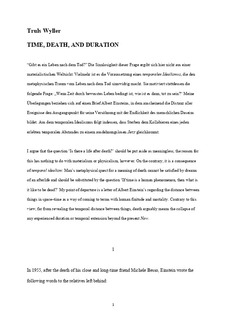| dc.contributor.author | Wyller, Truls | |
| dc.date.accessioned | 2019-12-05T08:55:38Z | |
| dc.date.available | 2019-12-05T08:55:38Z | |
| dc.date.created | 2019-01-18T20:50:03Z | |
| dc.date.issued | 2019 | |
| dc.identifier.issn | 0044-3301 | |
| dc.identifier.uri | http://hdl.handle.net/11250/2631868 | |
| dc.description.abstract | I argue that the question 'Is there a life after death?' should be put aside as meaningless; the reason for this has nothing to do with materialism or physicalism, however. On the contrary, it is a consequence of temporal idealism: Man's metaphysical quest for a meaning of death cannot be satisfied by dreams of an afterlife and should be substituted by the question 'If time is a human phenomenon, then what is it like to be dead?' My point of departure is a letter of Albert Einstein's regarding the distance between things in space–time as a way of coming to terms with human finitude and mortality. Contrary to this view, far from revealing the temporal distance between things, death arguably means the collapse of any experienced duration or temporal extension beyond the present Now. | nb_NO |
| dc.language.iso | eng | nb_NO |
| dc.publisher | Vittorio Klostermann | nb_NO |
| dc.title | Time, Death, and Duration | nb_NO |
| dc.type | Journal article | nb_NO |
| dc.type | Peer reviewed | nb_NO |
| dc.description.version | acceptedVersion | nb_NO |
| dc.source.journal | Zeitschrift für Philosophische Forschung | nb_NO |
| dc.identifier.doi | 10.3196/004433019827167654 | |
| dc.identifier.cristin | 1660738 | |
| dc.description.localcode | © 2019. This is the authors' accepted and refereed manuscript to the article. The final authenticated version is available online at: https://doi.org/10.3196/004433019827167654 | nb_NO |
| cristin.unitcode | 194,62,70,0 | |
| cristin.unitname | Institutt for filosofi og religionsvitenskap | |
| cristin.ispublished | false | |
| cristin.fulltext | postprint | |
| cristin.qualitycode | 2 | |
